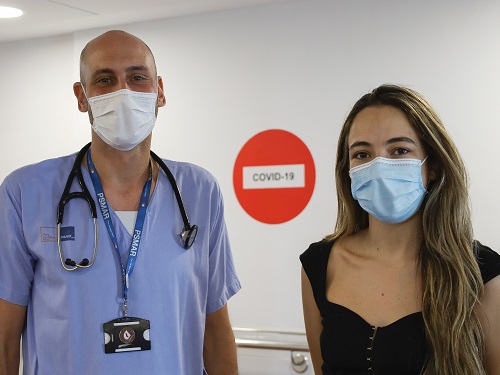
12/09/2022 - Press release
Individuals who have an immune system imbalance before COVID-19 infection have a worse prognosis compared to those with a stable immune defense system. This finding comes from a recent study published in the journal Frontiers in Medicine, conducted by physicians and researchers from Hospital del Mar, the Hospital del Mar Medical Research Institute (IMIM-Hospital del Mar), Universitat Pompeu Fabra, Universidad Autònoma de Barcelona, and the CIBER of Infectious Diseases (CIBERINFEC).

Robert Güerri and Ana Pascual
One of the key players in the immune system's fight against pathogens is T lymphocytes, which provide cellular immunity. Among them, the most representative are CD4 T lymphocytes, which organize the immune response, and CD8 T lymphocytes, which are cytotoxic and responsible for destroying invaders. Ideally, there should be a balance of 1 to 1.5 CD4 lymphocytes for each CD8 lymphocyte. However, this balance is not always stable, and an imbalance poses a risk in case of SARS-CoV-2 infection and the development of COVID-19. According to Dr. Robert Güerri, the head of the Infectious Diseases section and researcher at IMIM-Hospital del Mar and CIBERINFEC, "having a balanced immune system during the acute phase of the infection offers a better prognosis, with lower mortality and fewer complications. But if the CD4/CD8 balance is high, with inadequate CD8 expansion, there is a worse response in the acute phase of the infection and, therefore, worse prognosis, more respiratory distress and mortality."
In this study, researchers analyzed the levels of these cells and their balance in 388 patients admitted to Hospital del Mar during the first wave of the pandemic. Those who had a higher than normal CD4/CD8 ratio had a 4.6 times higher risk of death and double the chances of experiencing respiratory distress and requiring support. If the CD4/CD8 ratio was lower than normal, the risk also increased, but to a lesser extent (2.7 times more likely to die).
Early Therapeutic Approach
"Individuals with fewer CD8 cells than necessary during the acute phase may be more severely affected by the virus. Additionally, since their numbers do not expand well, the prognosis is worse," points out Ana Pascual, the lead author of the study, which is her Final Degree Project in Medicine jointly from Universitat Pompeu and Universitat Autònoma de Barcelona with Hospital del Mar. This conclusion is independent of the patients' age and sex. The evolution of lymphocyte numbers is regulated by genetic aspects of each individual, although it is known that SARS-CoV-2 can attack CD8 lymphocytes, preventing their multiplication to combat the infection and the disease.
Given this fact, having information about the balance of the immune system at the time of patient admission may help select those who require a more aggressive therapeutic approach to anticipate potential complications. According to Dr. Güerri, the results demonstrate the importance of "focusing on the importance of monitoring the immune response, as having a balanced and well-adjusted immune response affects the prognosis." This aspect is currently not taken into account when treating patients. Furthermore, the study's authors suggest that this finding may be applicable to other viral infections, thus providing an early prognostic marker for the progression of the disease.
Professionals from the Endocrinology and Nutrition and Geriatrics services at Hospital del Mar also collaborated on this study.
Reference Article
Pascual-Dapena A, Chillaron JJ, Llauradó G, Arnau-Barres I, Flores J, Lopez-Montesinos I, Sorlí L, Luis Martínez-Pérez J, Gómez-Zorrilla S, Du J, García-Giralt N, and Güerri-Fernández R (2022) Individuals With Higher CD4/CD8 Ratio Exhibit Increased Risk of Acute Respiratory Distress Syndrome and In-Hospital Mortality During Acute SARS-CoV-2 Infection. Front. Med. 9:924267. doi: 10.3389/fmed.2022.924267
© Institut Hospital del Mar
d'Investigacions MèdiquesLegal Notice and Privacy Policy | Cookie Policy | Site Index | Accessibility | Find Us | Contact